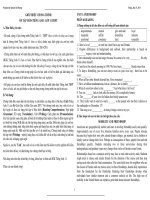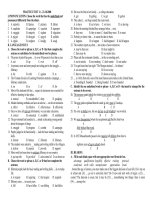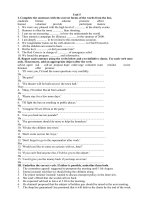UNIT 4 Bài tập mai lan hương lớp 11 key
Bạn đang xem bản rút gọn của tài liệu. Xem và tải ngay bản đầy đủ của tài liệu tại đây (91.85 KB, 3 trang )
UNIT 4
VOLUNTEER WORK
I.
Circle the word with the italic consonant sound different from that of
the others in each group.
1. hour
half
home
house
2. union
useful
under
university
3. water
whale
whole
window
4. when
who
where
which
5. usually
uranium
uniform
umbrella
6. answer
world
write
jewellery
7. children
kitchen
beach
chemistry
8. game
organize
angry
college
9. year
youth
jealous
yellow
10. ugly
unit
ulcer
upset
11. mow
lawn
forward
power
12. win
wine
wrong
wet
13. calm
would
folk
help
14. uncle
drink
danger
single
15. donation natural
situation
suggestion
II.
Complete each of the following sentences with the correct form or
tense of an appropriate verb from the box.
suffer
overcome
volunteer
repair
comfort
donate
participate
join
raise
perform
1. Claire volunteers at the homeless shelter once a week.
2. I've never seen this play performed before.
3. He was comforted to know that most students in the class knew even less
than he.
4. He made a rash decision and now he have suffered for it.
5. She overcame her difficulties to graduate.
6. Some people were in the streets raising money for charity.
7. He donated thousands of pounds to charity.
8. It was too badly damaged to be repaired.
9. Would you mind if I joined you for a drink in the bar?
10. We encourage students to participate fully in the running of the college.
III.
Choose the word or phrase with the same meaning as the underlined
part.
1. Each nation has many people who voluntarily take care of others.
a. bring along
b. get on with c. keep up with
d. look after
2. The construction work was carried out by the local contractor.
a. continued
b. completed c. done
d. run
3. Some high school students take part in helping the handicapped.
a. participate
b. compete
c. experience
d. support
4. She had never imagined being able to visit such remote countries.
a. foreign
b. faraway
c. friendly
d. desolate
5. The lawn needs mowing again.
a. repairing
b. making
c. bending
d. cutting
6. A bank has promised a donation of $24 million toward the disaster fund.
a. connection
b. addition
c. contribution
d. provision
7. Teachers have been asked to concentrate on literacy and numeracy.
a. the ability to read and write
b. basic skills in mathematics
c. good knowledge of literature
d. the ability to write books
8. We were involved in the anti-drug campaign up until the last minute.
a. included
b. affected
c. interested
d. taken part
9. English classes will be set up for the disadvantaged children.
a. built
b. started
c. chosen
d. taken
10. People are now raising money for flood victims.
a. sending
b. collecting c. paying
d. making
IV.
Rewrite the sentences beginning with an appropriate participle
(present, past or perfect).
1. When she saw the dog coming towards her, she quickly crossed the road.
Seeing the dog coming towards her, she quickly crossed the road.
2. If it is looked after carefully, the plant can live through the winter.
Looked after carefully, the plant can live through the winter.
3. As I don't have a credit card, I found it difficult to book an airline ticket over the
phone.
Not having a credit card, I found it difficult to book…
4. Keith spent a lot of time filling in job application forms because he was
unemployed.
Being unemployed, Keith spent a lot of time filling in job application forms.
5. Because I was walking quickly, I soon caught up with her.
Walking quickly, I soon caught up with her.
6. The house was built of wood, so it was clearly a fire risk.
Built/ Being built of wood, the house was clearly a fire risk.
7. I was eager to catch the bus in good time because I had been told off the day
before for arriving late.
Having been told off the day before for arriving late, I was eager to catch the
bus in good time.
8. She didn't know where the theater was, so she asked for directions at the
hotel reception.
Not knowing where the theater was, she asked for directions at the hotel
reception.
9. As she was a nurse, she knew what to do after the accident.
Being a nurse, she knew what to do after the accident.
10. He had spent his childhood in Oslo so he knew the city well.
Having spent his childhood in Oslo, he knew the city well.
11. The fruit was expensive because it was imported.
Being imported, the fruit was expensive.
12. We has spent nearly all our money so we couldn't afford to stay at a hotel.
Having spent nearly all our money, we couldn’t afford to stay at a hotel.
13. As we didn't want to offend him, we said nothing about his paintings.
Not wanting to offend him, we said nothing about his paintings.
14. Although James is known mainly as a writer of novel, he has now written a
successful biography.
15.
V.
1.
2.
3.
4.
5.
6.
7.
8.
9.
10.
11.
12.
VI.
Known mainly as a writer of novel, James has now written a successful
biography.
Although it had been hunted close to extinction, the rhino is once again
common in this area.
Having been hunted close to extinction, the rhino is once again common in this
area.
Choose the correct answer.
______ for twelve hours, I felt marvelous.
a. Having slept
b. have slept
c. Having been slept
d. have been slept
By the time their baby arrives, the Johnson hope ______ painting and
decorating the new nursery.
a. having finished
b. to have finished
c. having been finished
d. to have been finished
She's angry about ______ to the farewell party last night.
a. not having invited
b. not to have invited
c. not having been invited
d. not to have been invited
We decided not to travel, ______ the terrible weather forecast.
a. having heard
b. to have heard
c. having been heard
d. to have been heard
I'd love ______ to the party, but it was impossible.
a. having gone
b. to have gone
b. having been gone
d. to have been gone
I don't recall ______ him at the conference.
a. having seen b. to have seen c. having been seen d. to have been seen
______ in dark colors, the room needed some bright lights.
a. Having painted
b. To have painted
c. Having been painted
d. To have been painted
The stockbroker denied ______ of the secret business deal.
a. having informed
b. to have informed
c. having been informed
d. to have been informed
They now regret ______ their son by providing too many material
possessions.
a. having spoiled
b. to have spoiled
c. having been spoiled
d. to have been spoiled
______ to the party, we could hardly refuse to go.
a. Having invited
b. To have invited
c. Having been invited
d. To have been invited
Tom made a bad mistake at work, but his boss didn't fire him. He's lucky
______ a second chance.
a. having given
b. to have given
c. having been given
d. to have been given
Are you sure you told me? I don't recall ______ about it.
a. having told b. to have told
c. having been told
d. to have been told
Complete the sentences with the correct form of the verbs in
brackets.
1. The missing children were last seen playing (play) near the river.
2. Having completed (complete) the book, he had a holiday.
3. Found (find) only in the Andes, the plant is used by local people to treat skin
diseases.
4. The accident seems to have happened (happen) at around 1.00 p.m
yesterday.
5. Do something! Don't just sit there twiddling (twiddle) your thumbs.
6. Last year I studied abroad. I appreciate having had (have) the opportunity to
live and study in a foreign country. .
7. Looking (look) down from the hill, the town spread out before us towards the
coast.
8. Marta doesn't like to have her picture taken (take). She avoids being
photographed (photograph).
9. I don't agree with smacking (smack) children if they do something wrong.
10. The book published (publish) last week is his first novel.
11. Having photocopied (photocopy) all the papers, Sarah put them back in the
file.
12. I found a coin lying (lie) on the sidewalk.
13. Our mechanic said that he expects to have fixed (fix) the brake on the car
before we pick it up.
14. Life must be unpleasant for people living (live) near busy airports.
15. Having parked/ Parking (park) the car about a kilometre from the stadium, I
walked the rest of the way.
VII.
Choose the correct alternatives. Sometimes both are possible
1. He insisted to pay/ on paying for the meal.
2. The interviewer started off to ask/ by asking me why I wanted the job.
3. What am I going to do? I forgot bringing/ to bring my calculus text, and I need
it for the review today.
4. I can clearly recall him saying/ his saving that he was meeting 'Sarah at eight
o'clock.
5. Mrs Gates appreciated serving/ being served breakfast in bed when she
wasn't feeling well.
6. You'd better save/ to save some money for a rainy day. You can't count on
rescueing/ being rescued by your parents every time you get into financial
difficult.
7. Waiting/ Having waited six months for the washing machine being delivered/
to be delivered, I decided to cancel/ cancelling the order.
8. By telephoning/ In telephoning every hour, she managed to speak/ speaking
to the doctor.
9. The ticket enables you visiting/ to visit both the museum and the art gallery.
10. Watching/ Having watched television to the exclusion of all other activities is
not a healthy habit for a growing child.
11. Now I remember you ask/ your asking me to bring sandwiches to the picnic.
Your complains about my forgetting/ having forgotten things seem justified.
I'm sorry.
12. No one could make Ted feel/ to feel afraid. He refused to intimidate/ to be
intimidated by anyone.
13. The government plans to bring/ bringing in new laws forcing/ making parents
to take more responsibility for the education of their children.
14. When I was in the supermarket I noticed a man to take/ take some food off the
shelf and hide it inside his coat.
15. I overheard her tell/ telling Jack that she was serious ill.
VIII.
Complete each of these sentences with an appropriate preposition.
1. He left his job to take care of his sick daughter.
2. They will have the opportunity to participate actively in the process.
3. The government plans to set up a regional library system.
4. He waited until they had carried out his orders to the fullest.
5. I volunteered for service in the Air Force.
6. He is very good at playing games.
7. Some students volunteer to work in remote areas to provide education for
children.
8. Have you ever taken part in volunteer works?
9. All the students like joining in the Green Saturday Movement.
10. At the end of her life she suffered from Alzheimer's disease.
IX.
Imagine you are one of the villagers. Write a letter to thank the
students for what they have done. Use the cues given.
Dear Hanh and Trung,
1. I/ write/ thank/ what/ you/ do/ us/ during/ your stay/ remote village//
I’m writing to thank you for what you have done for us during your stay in our.
2. We/ really/ appreciate/ precious help//
We really appreciate your precious help.
3. The newly-built wooden bridge/ very/ useful/ daily transportation//
The newly-built wooden bridge is very useful to our daily transportation.
4. Also/ thanks/ your one-month literacy program/ villagers/ now/ able/ read/
newspapers/ though/ some difficulty//
Also, thanks to your one-month literacy program, the villagers are now able to
read newspapers though with some difficulty.
5. Thus/ we/ extremely thankful/ these invaluable things//
Thus, we’re extremely thankful for these invaluable things.
6. We/ wish/ good health/ great success//
We wish you good health and great success.
7. Look forward/ see/ you/ again/ next year//
Looking forward to seeing you again next year.
Sincerely yours.









